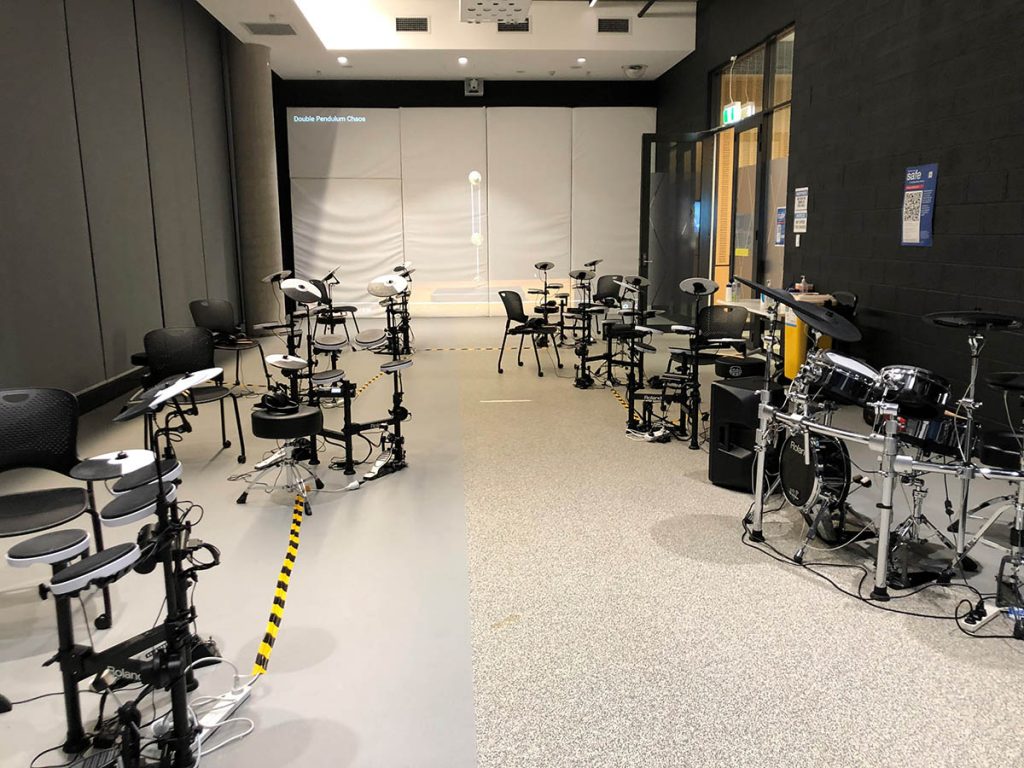Drummers often think of themselves as athletes, and research at an Australian university is examining how skills are developed, as Dr. Job Fransen and Dr. Rob Bower wrote in digitalDrummer.
Motor Control and Skill Acquisition
Motor control and Skill Acquisition are important pillars in the field of sport and exercise science. Together they relate to how our brain controls movements during the performance of motor skills and enable sports scientists to determine how motor skills are learned over time.
The production of sound through musical instruments such as the drum is considered to be a motor skill. The learning and performance of such skills depends largely on how well one is able to control one’s movements. Our research is based on a belief that drumming has enormous potential to test the capacity of human motor skill performance.
Drumming Skills Explored
Drumming is a task in which the arms and legs perform independent but related actions and, therefore, requires considerable amounts of motor coordination. Musicians aim to coordinate each limb in such a way that rhythmical sounds are produced. Sports scientists consider drumming to be a motor skill controlled by the brain and spinal cord within the central nervous system.
The process of control exerted over the performance of a motor skill is referred to as motor control. In short, movements are planned in the brain before movement commands in the form of electrical impulses are sent to the muscles through the spinal cord. These electrical impulses ultimately lead to the contraction of muscle fibres and allow us to exert a high degree of control over the drum strokes we produce. In turn, the movements of each limb produce sensory feedback from the position and change in position of our joints and muscles, or through visual and auditory information obtained from the outcome of our actions such as the volume or accuracy of each stroke. This feedback is utilised to adjust our movements accordingly and, for advanced drummers, with little or no conscious thought.
However, for those of us just learning to play the drums, substantial conscious thought is necessary during motor control and will often align with poor coordination and rhythm along with a general sense of confusion.
Using Drumming in the Sport and Exercise Science Classroom
Whether it be drumming or any other motor skill, untangling the required movement pattern is where the real learning takes place.
In the Bachelor of Sport and Exercise Science degree, students have the opportunity to investigate the role of the central nervous system in controlling movement as part of their coursework learning experience. This is done in our custom drum lab and is indeed one of their more enjoyable laboratory classes!
For student learning purposes, eight base model digital drum kits (Roland TD4KP) have been set up in the university’s skill acquisition research laboratory. The kits enable students to explore a concept known as the ‘degrees of freedom problem’.

The Sport and Exercise Science Classroom
This problem occurs when there are too many independent parts in a motor skill that need to be controlled in order to produce purposeful movement. In other words, a movement is seemingly so complex that the control of these independent parts appears to be almost insurmountable.
This is often the case for novices playing the drums. In order to produce even a simple rhythm using the hi-hat, snare and bass drums in a rhythmical pattern, the students need to coordinate the muscles in their right leg, right arm and left arm in such a way that the correct pattern emerges.
While for experienced drummers this may seem like a medial task, this is not so for novice drummers. During this activity, students experience firsthand how the central nervous system tries to overcome the complexity of the skill. For example, students experience how the central nervous system starts to favour symmetry over asymmetry (typically by pressing the bass drum pedal at the same time as hitting the hi-hat).

V-Drums Kit Set-up to Monitor Motor Skills
This is an interesting feature of the human body’s motor control at work! The central nervous system overcomes the complexity of coordination while drumming by deliberately decreasing the number of limb actions needing to be controlled independently of one another. For students, this experience becomes a powerful exploration of how the central nervous system controls movement. Furthermore, the teaching methodology used aligns with the University’s strategy for active learning.
Using Drumming to Answer Research Questions
The Sport and Exercise staff are also developing a research curriculum that utilises a professional drum set, a Roland TD-50 kit, and digital recording software to explore expertise in the context of drumming. Expertise research aims to investigate how exceptional achievements in a particular domain develop. For example, expertise researchers have explored the working memory capacity of chess players, the psychological and social determinants of educational achievements, and the career trajectories of elite athletes.
For this project, the team is specifically interested in how expertise develops in drumming and investigating the extent to which systematic practice environments (musical schooling versus self-taught drummers) influence the achievement of expertise. This will establish the extent to which expert drummers are able to exert such a high degree of control over their muscles in order to produce sound from such an elaborate instrument. The initial aim is to investigate the limits of motor control in expert drummers with this leading to future investigations around motor control in people with various physical and/or mental disabilities.
Article Credits
This article appeared in the February 2021 edition of digitalDrummer magazine (digitaldrummermag.com). Dr. Job Fransen and Dr. Rob Bower from the School of Sport, Exercise and Rehabilitation at the University of Technology Sydney are leading the motor skill development research.
